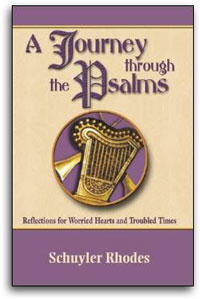Psalm 118:1-2, 14-24
Preaching
A Journey Through the Psalms: Reflections for Worried Hearts and Troubled Times
Preaching the Psalms Cycles A, B, C
Object:
Power is basic to our existence as human beings. How we define and utilize power determines much about how our lives and history move forward. Our history as a biblical people calls us to examine this carefully. Across the arc of our history we have had two choices, generally speaking, to make about power. The first is to choose to invest our hearts and energies in God's power. This choice is articulated by the psalmist here in verse 14. "The Lord is my strength and my might. He has become my salvation." The italics here are necessary because it is not a given that we choose God as the source of our power. The second option we have is to decide to wield power on our own. The classic story of this is found in 1 Samuel 8, where the people reject God in favor of a king so that the people can be like "other nations." It seems that keeping up with the Joneses is older than we thought.
The power wielded by us is what Paul refers to as the powers of "this world," or the cosmos. It is characterized by threats of force or coercion. It is enforced by rigid economic stratification and control, and it inevitably leaves a wake of death and injustice in its path.
Conversely, the power of God is defined and used quite differently. If we find power and strength in God, this power is underscored by adoration and love. It is carried out with justice and equity, and it insists on equity for all people. Following in the footsteps of this kind of power we find very different results (Isaiah 61).
On Easter Sunday we see this power burst forth from an empty tomb to conquer death itself. God's power comes to us as the ultimate redemptive act of self-giving love. In God's act in Christ, power is not merely given to another leader in a long line of despots. Power itself is transformed so that what we thought was strong is actually weak (1 Corinthians 1:18 ff). Those who are wise are now seen as foolish and the rich and powerful no longer hold sway.
Yes, God is our strength and our salvation. Out of the two choices we have to make regarding power in our lives, it seems clear which one we should make. Perhaps this Easter we will choose the risen one as our source of power and life, our hope and our redemption.
The power wielded by us is what Paul refers to as the powers of "this world," or the cosmos. It is characterized by threats of force or coercion. It is enforced by rigid economic stratification and control, and it inevitably leaves a wake of death and injustice in its path.
Conversely, the power of God is defined and used quite differently. If we find power and strength in God, this power is underscored by adoration and love. It is carried out with justice and equity, and it insists on equity for all people. Following in the footsteps of this kind of power we find very different results (Isaiah 61).
On Easter Sunday we see this power burst forth from an empty tomb to conquer death itself. God's power comes to us as the ultimate redemptive act of self-giving love. In God's act in Christ, power is not merely given to another leader in a long line of despots. Power itself is transformed so that what we thought was strong is actually weak (1 Corinthians 1:18 ff). Those who are wise are now seen as foolish and the rich and powerful no longer hold sway.
Yes, God is our strength and our salvation. Out of the two choices we have to make regarding power in our lives, it seems clear which one we should make. Perhaps this Easter we will choose the risen one as our source of power and life, our hope and our redemption.


